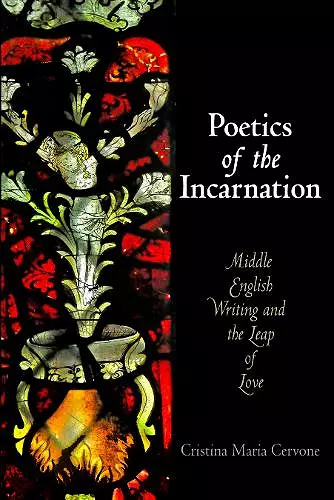Poetics of the Incarnation
Middle English Writing and the Leap of Love
Format:Hardback
Publisher:University of Pennsylvania Press
Published:4th Feb '13
Currently unavailable, and unfortunately no date known when it will be back

Poetics of the Incarnation examines fourteenth-century writers whose poetry and narrative explore the intellectual implications of the hypostatic union. The Incarnation inspired a working-through of the philosophical and theological implications of language while Middle English was emerging as a legitimate medium for theological expression.
The Gospel of John describes the Incarnation of Christ as "the Word made flesh"—an intriguing phrase that uses the logic of metaphor but is not traditionally understood as merely symbolic. Thus the conceptual puzzle of the Incarnation also draws attention to language and form: what is the Word; how is it related to language; how can the Word become flesh? Such theological questions haunt the material imagery engaged by medieval writers, the structural forms that give their writing shape, and even their ideas about language itself. In Poetics of the Incarnation, Cristina Maria Cervone examines the work of fourteenth-century writers who, rather than approaching the mystery of the Incarnation through affective identification with the Passion, elected to ponder the intellectual implications of the Incarnation in poetical and rhetorical forms. Cervone argues that a poetics of the Incarnation becomes the grounds for working through the philosophical and theological implications of language, at a point in time when Middle English was emerging as a legitimate, if contested, medium for theological expression.
In brief lyrics and complex narratives, late medieval English writers including William Langland, Julian of Norwich, Walter Hilton, and the anonymous author of the Charters of Christ took the relationship between God and humanity as a jumping-off point for their meditations on the nature of language and thought, the elision between the concrete and the abstract, the complex relationship between acting and being, the work done by poetry itself in and through time, and the meaning latent within poetical forms. Where Passion-devoted writing would focus on the vulnerability and suffering of the fleshly body, these texts took imaginative leaps, such as when they depict the body of Christ as a lily or the written word. Their Incarnational poetics repeatedly call attention to the fact that, in theology as in poetics, form matters.
"Cervone's book deserves to be widely read both for its own richly suggestive content and for placing before us, in highly original readings, the larger issues at stake as medieval studies increasingly turns its attention to formalist concerns." * Journal of English and Germanic Philology *
"A very interesting and original book. . . . It impels one to turn again to the texts that it discusses. While I had read most, if not all, of these texts before, I have to confess that I thought many of them too 'manneristic' (to use Curtius's term) to teach or to discuss seriously with colleagues. I have learned better from this book and I am happy to stand corrected." * Speculum *
"In this startlingly original, highly suggestive, and lovingly written book, Cristina Maria Cervone writes of incarnational poetics as from the heart of imaginative understanding. Close analyses of major and minor texts find their common appeal in their extraordinary imagining of the metaphorics of incarnation. A work of subtle and meticulous scholarship which is above all about the poetic imagination." * Derek Pearsall, Harvard University *
"This is a virtuoso study, a substantial, unusual, often brilliant contribution to Middle English stylistics and poetics." * Nicholas Watson, Harvard University *
"Cervone's book is a work of high order-polished, original, stamped by a formidable poetic and philosophical mind." * Barbara Newman, Northwestern University *
ISBN: 9780812244519
Dimensions: unknown
Weight: unknown
320 pages